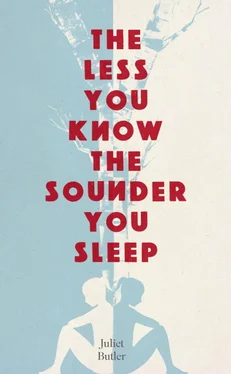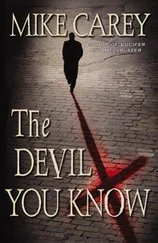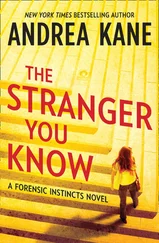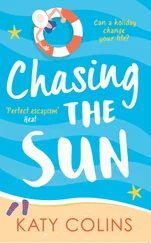At two years of age they show solidarity by both crying when one of them is in pain. However, by this age Masha exhibits a clearly aggressive attitude to Dasha. Masha pinches or thumps her and takes away her spoon.
From the age of four they were subjected to more advanced tests to compare and evaluate their conditioned reflexes. On seeing or hearing a stimuli such as a metronome that signals the administration of an electric shock, Dasha reacts more rapidly and with more sensitivity. Her heart beats violently while Masha’s remains relatively calm. When a spurt of cold air is squirted into the iris of their eye from a rubber tube, Dasha turns away and screws up her eyes crying while Masha just blinks rapidly and cries. We repeated this experiment sixty-two times until Dasha also just blinked instead of crying.
When left without stimuli they sometimes play ‘games’ together, copying adult behaviour, for example pretending to give each other injections, take blood or insert feeding tubes. When older they were moved to the window and would stare out at the cars and buses with great interest and for long periods of time.
By the age of six it is clear that Dasha is much more obedient. She listens attentively to instructions and tries conscientiously to do her best to fulfil them. Masha’s behaviour is very different. She quickly loses interest or refuses to carry out the tests. For example, one game to test their reactions involved each twin holding a bladder and squeezing it on seeing a flashing light. Dasha always responded diligently but Masha turned away and threw down the bladder after eight to ten goes. When told to pick it up she sometimes refused to play altogether saying, ‘Squeeze it yourself.’ Masha continues to be aggressive to Dasha, who now does not fight back.
Both twins react identically to the heart/eye reflex where the heart is slowed down (and can be stopped altogether) by applying pressure to the eyeball.
In general, Dasha is far more advanced than Masha, in both speech, mobility and intellectual development. However it is evident that the tests were more difficult for Dasha’s nervous system to withstand than Masha’s and this points to the relative weakness of her nerve processes.
Text of interview with Katya Krivoshlyapova
I didn’t know I was having twins. I was in labour for two nights and two days. I remember clearly, as clearly as if it was yesterday, the doctor looking down at my baby and shaking his head in disbelief: he said he’d never seen anything like it in all his life. I was frightened and started crying. Then he held the baby up to show me but I couldn’t see because my eyes were filled with tears. They carried it out – I thought I could hear two cries – and after a bit, a woman in a white coat came in to see me. I didn’t know if she was a nurse or a doctor but she told me that I’d had urodi, mutants. She didn’t tell me why or what they looked like or even if they were still alive. She just said she was very sorry and walked away. I suppose that was their way of explaining to me that they were taking them away from me. All the other mothers in my ward had their babies brought in every four hours to feed them, but they didn’t bring me my babies and they didn’t tell me anything else. I suppose it was a week later and I hadn’t stopped crying, day and night, dropping in and out of sleep because I was sure I could hear them, my own babies, down the corridor crying, when another doctor came in, a man. He told me to stop all this weeping and wailing because I was upsetting the other mothers. He told me I was only being kept in because I’d lost so much blood. He told me my babies weren’t expected to live beyond a few weeks and to forget about them. But I couldn’t, how can you just forget your children when you’ve longed for them so much? When you love them so much?
From then on I lay with a pillow over my head so no one could hear me weeping. I can’t remember sleeping at all…
My husband was called in to look at them straight after the birth and he saw them lying on a table naked and he rejected them straight away. He told the doctors they couldn’t be his and he didn’t want his name on the birth certificate and he refused to see me as well. It was a terrible disgrace for him… So all I had now was my babies, my twins. I didn’t know what they meant by mutants, it could have meant anything, I just wanted to see them. There was a night-cleaner there who had a young child herself and she’d sit sometimes and pat the pillow on my head while I cried. Then one night, in the early hours of the morning when there were no doctors around, the door swung open and she walked in holding this tiny, swaddled bundle with one dark head each end. They were asleep… She put them into my arms and I rocked them and sang to them and kissed the top of their little heads… my own daughters… my dochinki… they looked so perfectly beautiful.
I never saw them again. It must have been a week or so later when I was better that they asked me to sign the forms rejecting them. I asked what that meant and they said it meant they’d be looked after by the State. I asked if I could visit them if I rejected them and they said I couldn’t, so then what was I to do? I couldn’t sign the forms. I thought it would be better if they were looked after by the doctors than coming back to the barracks with water on the dirt floor and not a stick of firewood for the stove. But I couldn’t reject them, what mother could do that? I was sent home and I was lying in bed still weak from the loss of blood and it was maybe a week after I’d left the hospital when there was a knock at the door and a woman wearing a white doctor’s coat walked in, sat on the edge of the bed and told me she was a physiologist and that she was very sorry but she’d come to break the news that my babies had caught pneumonia and died…
Aaakh, how do you think a mother would feel on being told her babies had died? How would any mother feel? I lay there for days or it might even have been weeks, staring up at the ceiling and picking over my life, piece by piece, wondering why I’d been put on earth when my one chance of joy in it had been so cruelly taken away. And Misha? I had my tears to wash away my sorrow and he had vodka to wash away the shame of having had such twins. Like every man, he had vodka…
I went back to the doctors when I was well enough and asked to see the grave, I wanted to put flowers on it, but they told me their bodies had been preserved for science. I even went to the Kunstkamera Museum of Horrors in St Petersburg to see if they had been preserved in a jar there. And then all those years later when I found they were still alive, they’d been alive all these years – I felt so sorry to have not looked more for them, so sorry that I formed them like that in my womb, and then all I could do when I met them was cry. I couldn’t understand why the doctors had lied to me. When I met them I thought they would have been told I was still alive. Now I think perhaps they weren’t…? I can’t understand why the scientists deprived two children of a mother and let them live and grow up without me. I would have done anything for them when they were growing up, anything. And then, when they found me again it was the same, I would have done anything to make up for lost time, to make up for having formed them like that, but it wasn’t to be. It was too late. They found me and then they rejected me… perhaps I deserved it. But I loved them. I always held them in my heart and loved them. I love them now.
The majority of characters in the novel are real, as are their names. Some minor characters – such as Baba Iskra, Ivan Ivanovich, Uncle Styopa, Yemil Moseyevich, Baba Yulia and Aunty Dusya – are based on people the twins described to me, but the names are fictional. Sanya is a composite of cleaners they knew in the Twentieth and Sixth. Olessya is largely based on herself with aspects of other friends they knew throughout their lives in her character.
Читать дальше
Конец ознакомительного отрывка
Купить книгу












